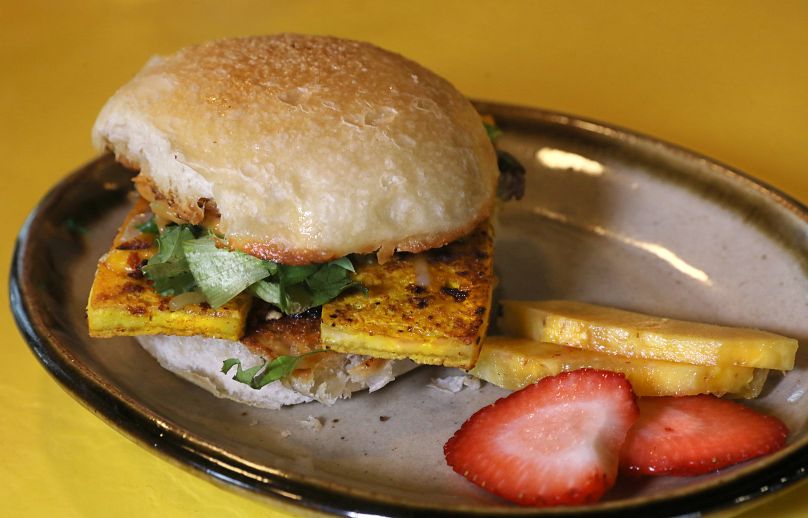Vegans eat more ultra-processed foods than any other diet. How bad is that really for health and the environment?
Veganism has the potential to promote healthy eating as people ditch meat - but the rise of ultra-processed foods (UPFs) could hamper its positive effects.
 ADVERTISEMENT
ADVERTISEMENT
 ADVERTISEMENT
ADVERTISEMENT
Product launches for plant-based convenience foods tripled between 2013 and 2018. In the UK, half the population have added meat substitutes to their diets, while almost a third opt for alternative milks.
Many of these plant-based substitutes are classified as UPFs: foods that have undergone heavy processing to improve their perishability and taste. UPFs are often high in salt, sugar and saturated fat, with additional colourings, preservatives and additives.
In France, UPFs comprise 39.5 per cent of the total calorie intake in a typical vegan diet – more than for vegetarians and meat eaters.
A study in Germany discovered that although general consumption of ultra-processed plant-based alternative foods (PBAFs) is low, 39.1 per cent of vegans and vegetarians eat them at least once a month.
“We found that there is more processed food in vegan and vegetarian diets than we thought,” says Dr Antje Risius, who co-authored the study last year.
“You have to be careful when you integrate such products into a wholefood diet,” adds her colleague, Marlene Ohlau. “Compared to meat, they're super helpful, but when you integrate them in a plant-based diet, which is supposed to consist of vegetables, fruits, and wholefoods, they're not as good because of this processed character.”
How do vegan UPFs affect our health?
The UK’s BBC Panorama show recently highlighted several health risks that could be linked to UPFs, including cancer, cardiovascular disease, diabetes, stroke and obesity.
The picture for plant-based meat substitutes is more complicated. Some researchers stress that these products have less saturated fat and more fibre than meat equivalents.
They also help consumers avoid red meat, which the WHO has designated as carcinogenic.
Yet not all meat alternatives are created equally. In 2018, Action on Salt found high levels of sodium in many plant-based substitutes. Fry’s Special Traditional Burger (sold in Britain), for example, contained three times more salt than a packet of crisps.
“We cannot really say they are healthier than meat, because it depends on what type of meat,” says Risius. “When you look at meat substitute sausages, you also have a bad health effect.”
According to the Soil Association, part of the problem is the manufacturing itself, which alters the structure of foods.
“It changes what's known as the food matrix,” says Cathy Cliff, the Soil Association’s policy advisor. “Whereas in an original plant material, you get the whole makeup of the food that is naturally produced, in ultra processing, it's almost like the products aren't foods anymore. The physical and chemical composition, and the excessive quantities of refined ingredients, is having an effect on our health.”
Certain additives can tarnish UPFs with their own risks. Last year, carrageenan - an emulsifier derived from red seaweed, which gives Alpro’s longlife chocolate shakes their creaminess - was linked with postmenopausal breast cancer.
But even where products are benign, they reduce our diets’ overall quality by leaving less room for wholefoods.
“Instead of making up your diet with minimally processed foods - including tinned and frozen produce, fresh breads, and healthy cereals - they're being displaced by ultra-processed foods, which have little nutritional value when they dominate our diet,” says Cliff. “We're not saying never eat these foods, but we need a better balance.”
UPFs and the environment
Meat production’s devastating impact on the environment is well established, but UPFs bring their own costs.
“Ultra-processed food production relies on a relatively small number of commodity crops, like palm, soya, wheat and maize,” says Cliff. Mass production of these crops lends itself to monocultures, which contribute to deforestation, soil degradation and habitat loss.
The UPF industry could account for as much as 39 per cent of energy use, 45 per cent of biodiversity loss, and a third of greenhouse emissions related to diet, according to one recent study.
“We know that more than 130,000 hectares of rainforest was cleared for palm production in Indonesia between 2015 and 2018, and the Brazilian Serato has been destroyed at an even faster rate than the Amazon for soya production,” says Cliff.
The impact from plant-based UPFs is lower than meat - only a quarter of the world’s soy production is grown for food, according to WWF, while the rest is turned into animal feed - but manufacturing them remains energy intensive.
“It’s high end technology that's modifying the ingredients and making them into ultra-processed products,” Cliff explains. “Then there's the transportation costs, because these products are going all over the world, and the food waste and packaging waste that you don't necessarily get with a veggie box.”
Overhauling the food system
In January, the Soil Association launched Taking the Biscuit, a campaign which calls for a complete rethink of how we grow food.
In place of mass produced UPFs, it promotes agroecology – farming that emphasises local food networks and natural agriculture techniques, of which organic farming is one certified type.
“We're talking about a healthy connection between nature-friendly farming and nature-friendly food,” says Cliff. “You get these fair supply chains and community power, and then healthy soils and crop diversity. There's also things like farming with trees, so agroforestry, which brings biodiversity and climate benefits to the farm.”
In 2021, an independent review for the UK government called the Henry Dimbleby National Food Strategy recommended agroecological farming as a key solution. What we need next, according to Cliff, is actionable government strategy and investment to make agroecology mainstream.
“There's so much the government could be doing through various agro-environment schemes,” she says. “Making sure that farmers are rewarded for acting more sustainably, but also helping to make healthy, organic and agroecological products available through schools and hospitals, and supported to go into the wider supply chain.”
Balancing health and sustainability
As with all things, healthy eating comes down to balance. Rose Wyles, ‘The Vegan Nutritionist’, recommends eating UPFs in moderation - or avoiding them altogether.
“Instead, vegans, as well as others, can incorporate wholefoods into their diets, such as fruits, vegetables, whole grains, legumes, nuts, and seeds,” she says. “These foods are rich in nutrients and help prevent chronic diseases.”
Some processed foods are also suitable to fill the nutritional gap that meat and plant-based substitutes would otherwise fill.
“Tofu and tempeh are considered healthy processed foods because they are minimally processed and retain most of their nutrients,” says Wyles. “They are also good sources of protein, iron, and calcium, which are important nutrients for vegans.”
Ohlau points out that our taste for UPFs is tied to their function as convenience food. Improving our diets could mean reappraising our lifestyle.
“There is a new culture where we do not cook that much anymore and we want to have fast food,” she says. “The further step would be to bring back a certain cooking culture.”
How much we ought to incorporate UPFs also depends on our existing dietary habits. While vegans would do well to follow a traditional wholefoods diet, meat eaters could still benefit from switching to plant-based substitutes.
“We have to find ways to integrate them in a meat-based diet,” says Ohlau. “This is what they're supposed to do - to reduce meat consumption.”












